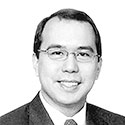
The View From Taft
By Benito Teehankee

The May 12 midterm general election is only days away. This election season once again confronted us with a dizzying barrage of Pinoy-style campaign messaging. Streets and media channels have been awash with banners, jingles, and carefully crafted soundbites. Familiar names — often dynastic or celebrity — have dominated airwaves and social media feeds. And just like in previous years, our national discourse slid further away from the serious and deliberative debate that democracy demands. In its place, we saw an avalanche of emotion-driven appeals, political spectacle, and superficial promises. We need to ask ourselves: Do we still have a functioning democracy — or have we descended into what some would call a “democrazy”?
I have always been frustrated by how we prioritize elections over everything else. At its core, democracy is not just about voting. It is about self-rule — people collectively identifying the common good and choosing leaders who are accountable to the will of the governed. In a republican democracy like the Philippines, this requires both a framework of laws that protect individual rights (protective democracy) and institutions that allow for meaningful public engagement beyond elections. But what we have seen for many decades instead is a degeneration of democratic practice into what political theorist David Held calls competitive elitist democracy — a system where elites compete for the people’s votes, while the public remains largely passive and disengaged.
The 1987 Constitution enshrines protective democratic principles: rule of law, separation of powers, checks and balances, and rights-based governance. But in practice, it is electoral competition among entrenched elites and personalities that dominates. With every election, more dynastic families consolidate power, and more celebrities enter politics with little scrutiny of their policy positions or governance plans. National development issues — corruption, quality jobs, poverty, inequality, education, sustainable development, even artificial intelligence — rarely find meaningful space in our campaign narratives.
The result? A widening gap between what democracy should be and what it has become.
Our political culture is deeply rooted in a feudal and cacique tradition, where power is not built on policy competence or civic virtue but on personal loyalty, patronage, and showmanship. Leaders are rarely held accountable for corruption, inefficiency, or incompetence. Impunity reigns, as evidenced by the outrageous behavior of some public officials — unchallenged, even rewarded, by a permissive media ecosystem.
The Philippine media ecology — dominated by social media — is central to our democratic crisis. As Zac Gershberg and Sean Illing have argued in The Paradox of Democracy, social media culture has eroded the conditions needed for liberal democracy to thrive. It accelerates misinformation, shortens attention spans, and replaces rational public debate with viral emotional appeals. Instead of forums for reflective discourse, our public spheres have become battlegrounds of noise, spectacle, and distraction. The entertainment industry’s logic — fame over substance — infects our politics.
Hence, it is no surprise that the Philippine National Police has already reported more than a dozen killings for this election cycle. When political contests are battles for control of wealth and influence rather than contests of ideas, violence follows. When democratic institutions are weak, and public reason is absent, chaos prevails.
So, where do we go from here?
First, we must animate the democratic ideal of our Constitution — the belief that the people, through reasoned and collective deliberation, can govern themselves. This begins with a cultural shift. Citizens must learn to identify public issues in terms of the common good, not just narrow interests. We need more civic education, media literacy, and critical thinking skills, especially for the youth. Public discourse must move beyond the binary of loyalism and opposition, and toward shared inquiry and constructive dissent.
Second, we must confront the accumulated political power of business and oligarchic interests that influence not just policy but even the choice of candidates. When economic elites shape political agendas, public welfare is sidelined in favor of private gain. A democracy where economic and political power is concentrated in the hands of a few is neither just nor sustainable.
Lastly, we must demand institutional reforms that promote real accountability. This includes strong anti-dynasty laws, campaign finance reforms, independent media, and mechanisms for citizen participation between elections. True democracy is not a one-day event at the ballot box — it is a continuing project of building and sustaining institutions that make the people’s voice matter.
If we continue down our current path — of emotional politics, dynastic control, media trivialization, and public disengagement — we risk the continued reduction of our democracy into farce. But if we act together in a sustained way beyond elections, we can reclaim its promise and fulfill our constitutional vision of shared prosperity and quality life for all.
Democracy must be defended — not just against tyrants, but against apathy, ignorance, and the seductive pull of democrazy.
Dr. Benito Teehankee is a full professor at the Department of Management and Organization of the Ramon V. Del Rosario College of Business at De La Salle University. He is the chairman of the Shared Prosperity Committee of the Management Association of the Philippines.